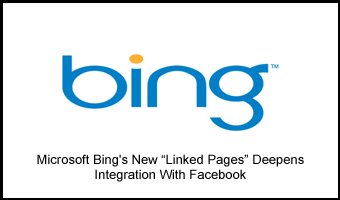
At present, the newly released option is in beta and is available to testers in the U.S. only, which the software maker describes it as a way to let users have more control in how they show up on Bing,
The Linked Pages feature lets users verify themselves using their Facebook credentials, and then determine which pages and sites their profiles are linked to in Bing search results. The overall concept is to give people more control over how they are viewed online, while making results more relevant to people conducting searches.

“Now your friends looking for you online can effortlessly find what you want them to find. You can also link pages to your friends to help them shine on Bing as well,” said Microsoft officials in a post on the Bing Community blog.
In order to start linking, users need to log in using their Facebook credential, and then search for yourself and tag appropriate pages with a “link to me” button. Besides, the initial page also asks users to authorize Bing permission to post to Facebook. A Microsoft spokesperson said users cannot skip this step the first time they log into Linked Pages.
However, to expand the process further, Linked Pages lets you select which search results are actually related to you–whether it is a personal site, your workplace, or even sites you just happen to like-and then link them so that they will show up when you’re searched in Bing.
Additionally, links can include your home towns, schools, blogs, employers, personal Web sites, organizations you are associated with or even “just sites you like,” according to the post.
Interestingly, users also can indicate links about their friends, but those would not show up automatically–“We will ask your friend for permission first, and then once granted post on their Facebook Timeline that they were linked on Bing,” according to the post. Users can withdraw links they added or that others added about them at all times, according to the Softies.
This is not the first time the two are collaborating together on Bing. In May 2011, Microsoft announced the ability of Bing users to receive personalized search results ‘based on the assessments of your friends’ by signing into Facebook. Hence, users could see what their Facebook friends liked on the Web, making their searches more “conversational.”
Nevertheless, this is another example of Microsoft making good use of Facebook integration to differentiate its search engine, which remains a distant second to Google in market share. Microsoft is a minority investor in the dominate social media network.
Lastly, Bing will have to formulate other features if it wants to catch up with Google’s efforts in combining social and search–namely via its Google+ network.
Check out Linked Pages on Bing by visiting bing.com/linkedpages.


